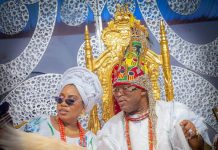President Muhammadu Buhari has acknowledged the growing influence of social media on global politics, urging world powers to rally and protect freedom of speech.
Mr Buhari commented at the general debate of the United Nations General Assembly on Wednesday while addressing climate change policies and initiatives.
“There was a time when the most important event at this Assembly was the speech by the world’s most powerful leaders. Now a Tweet or Instagram post by an influencer on social or environmental issues may have greater impact,” Mr Buhari said.
“Technology offers us nearly limitless opportunities and sometimes runs ahead of the imagination of regulators and legislators. At its best, social media helps strengthen the foundations of our society and our common values.”
Mr Buhari added that world powers must “come together to defend freedom of speech, while upholding other values that we cherish.”
The Buhari-led administration has seen the shrinking of the civic space due to multiple infringements of the freedom of speech.
Last year, Mr Buhari clamped down on Twitter in response to a deleted tweet which violated the social media platform’s guidelines.
The federal government announced the suspension of Twitter operations in the country on June 4, after the social media giant deleted a post by President Muhammadu Buhari for a “violation of the company’s abusive behaviour policy.” By June 5, the suspension was carried out by telecommunications companies as Nigerians witnessed Twitter’s shutdown across all platforms.
The #Twitterban lasted for 222 days, attracting condemnation from citizens and the international community, further damaging Nigeria’s democratic and rights credentials on a global scale.
Canada, the United States and the United Kingdom all spoke against the ban, citing infringements on the constitutionality protected freedom of speech.
The ban affected businesses, especially the Small and Medium-scale Enterprises (SMEs) and the government at different levels as Nigeria’s unemployment and insecurity concerns worsened under the Buhari-led administration.
In 2019, Mr Buhari declined to assent to the Digital Rights and Freedom Bill. He said the bill covered too many technical subjects and “fails to address any of them extensively.”
The bill aimed to “provide for the protection of the human rights online, to protect internet users in Nigeria from infringement of their fundamental freedoms and to guarantee application of human rights for users of digital platforms and/or digital media and for related matters”.
A coalition of Non-Governmental Organisations (NGOs) launched reports noting how the Nigerian government used security concerns to intimidate civic spaces in the country.
The report titled Nigeria: Shrinking Civic Space in the Name of Security, explored how the government used security challenges to undermine the ability of citizens to speak, associate, and organise freely. This is evident in the military crackdown on unarmed protesters at the anti-police brutality #EndSARS protests in 2020.




